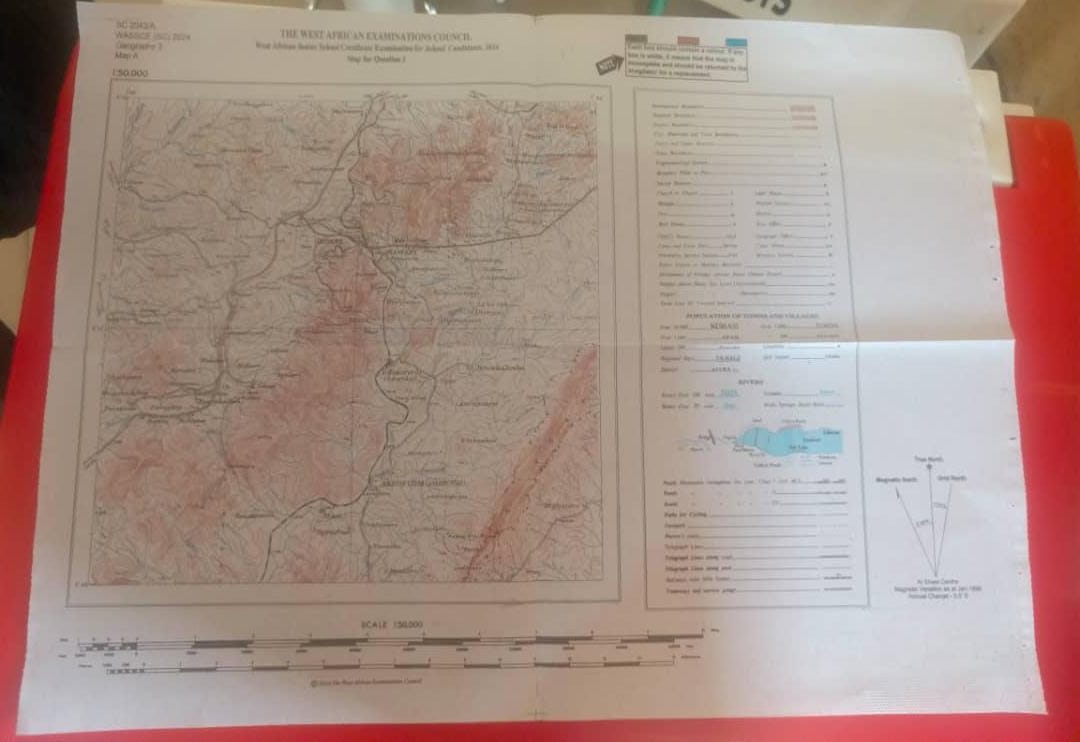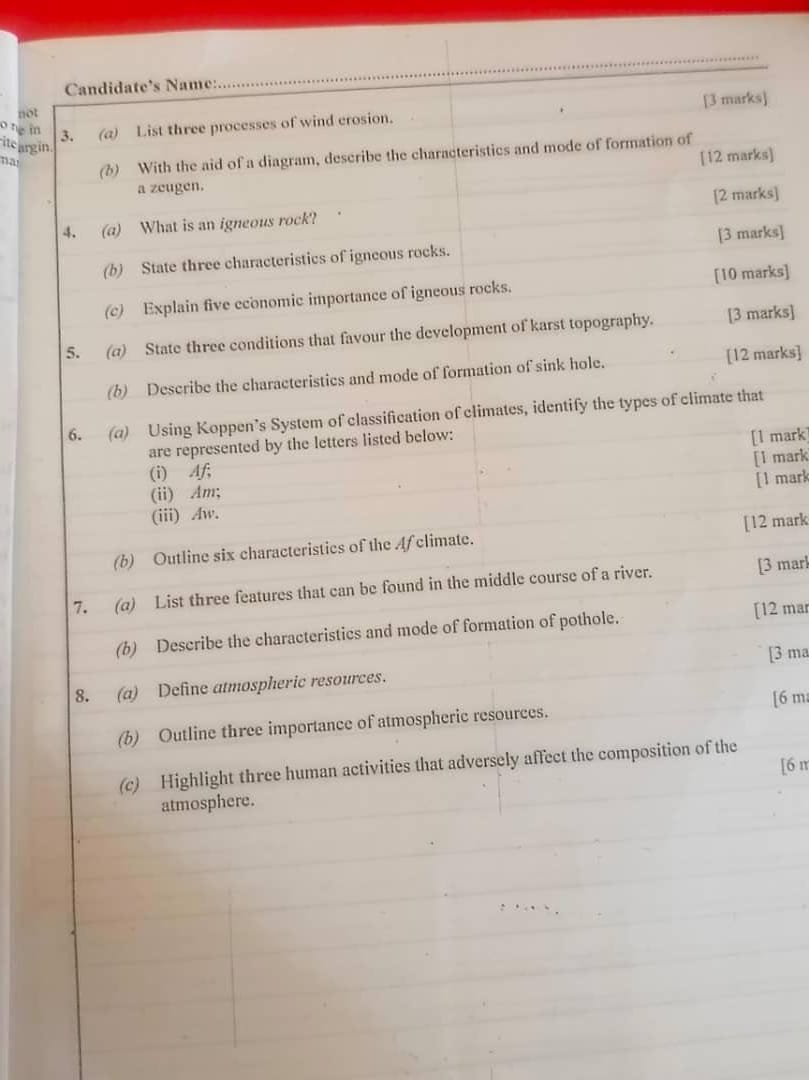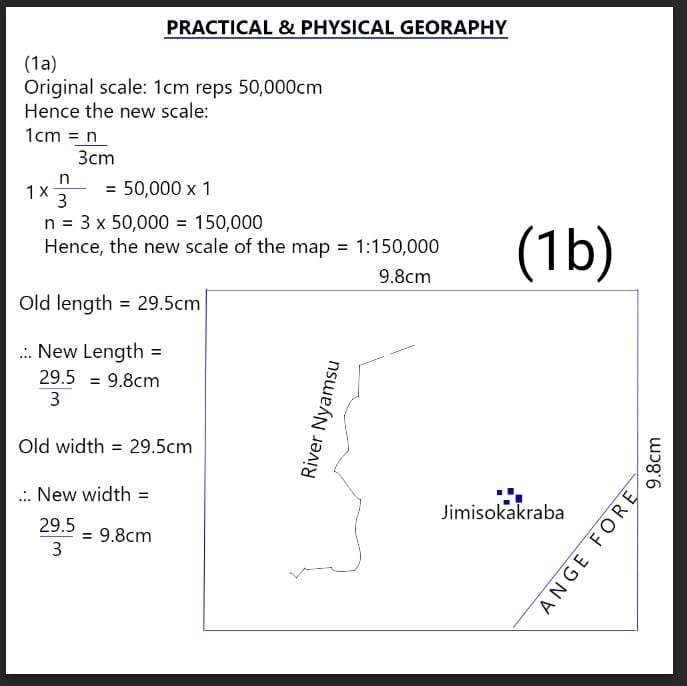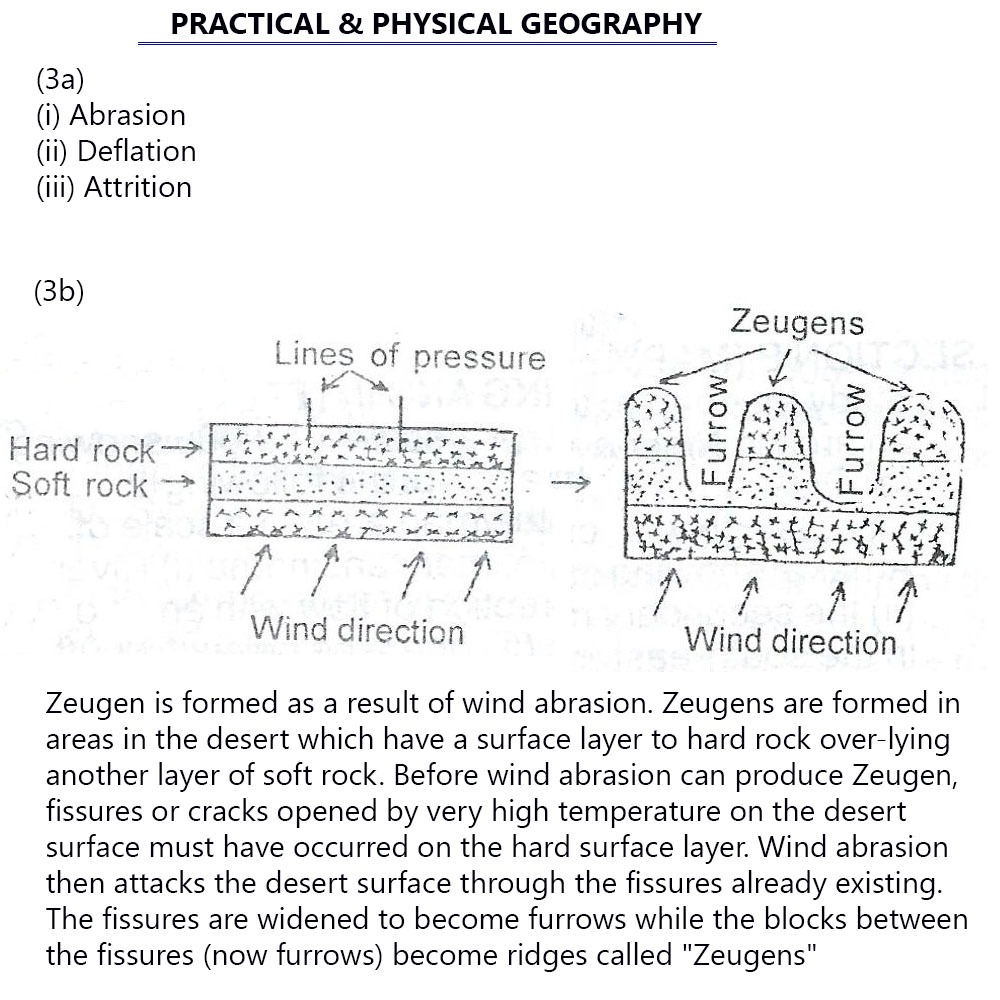Join Our Telegram Channel
Join Our Whatsapp Group
WAEC Geography Practical 2024 Answers, question on Geography Practical waec 2024, WAEC Geography Practical Answers 2024. WAEC 2024 Geography Practical, 2024 WAEC Geography Practical Answers, WAEC Geography Practical 2024
Friday, 31st May 2024
Geography 3 (Practical and Physical Geography) 3:30pm – 5:20pm
PLEASE NOTE: You’re to answer Question 1 and any other THREE.
(1a & b)
*Please make sure u measure the length and width with your ruler while drawing.They are both 9.8cm*
(i) River Nyamsu flows south-west to north-east.
(ii) The ridge at the south-eastern part of the mapped area is called Nyambene hill
(iii) Jimisokakraba settlement is located at the south-western part of the mapped area.
(1c)
(PICK ANY THREE)
(i) Linear Elevation: It is a long, narrow elevated landform that typically extends for several kilometers, therefore, it is a ridge
(ii) Steep Slopes: The sides of the ridge is made up of steep, forming sharp angles with the adjacent valleys or plains.
(iii) Sparse Vegetation: There is limited plant growth due to poor soil stability.
(iv) Crest: The top of the ridge, known as the crest, is narrow.
(v) Drainage Pattern: There is fast surface runoff for gullies or stream channels.
(vi) Parallel Formation: It occur in parallel sequences and valleys are aligned in a linear pattern.
(1d)
(PICK ANY THREE)
(i) Roads avoid steep slopes in the entire map.
(ii) The main road is found in the northwestern part of the map where the relief is gently rolling.
(iii) The secondary road avoids hills and ridge at the southern part of the map
(iv) The minor road in the mapped area runs parallel to the rugged relief from the North to south.
(v) Roads avoid highlands and take advantage of lowlands in the mapped area.
(3)
(4a)
(PICK ANY ONE)
An igneous rock is a type of rock that forms from the cooling and solidification of molten rock material, either magma beneath the Earth’s surface or lava on the surface. Examples include granite and basalt.
OR
An Igneous rock is a rock that is formed as a result of hot molten magma escaping to earth surface and cooling. Examples are granite and basalt.
OR
An Igneous rock is a type of rock that crystallizes from molten magma or lava, forming intrusive or extrusive structures based on where it cools. Examples: granite and basalt.
(4b)
(PICK ANY THREE)
(i) Igneous rocks typically have a crystalline texture, where the minerals form interlocking crystals.
(ii) They are composed of various minerals such as quartz, feldspar, mica, etc.
(iii) Igneous rocks are generally hard and durable due to the strong bonding between their mineral components.
(iv) Igneous rocks do not contain fossils because they form from molten material, which destroys any organic matter.
(v) They can have a wide range of chemical compositions, from felsic (rich in silica) to mafic (rich in magnesium and iron).
(4c)
(PICK ANY FIVE)
(i) Construction Material: Igneous rocks like granite and basalt are extensively used as construction materials for buildings, roads, and monuments due to their strength and durability.
(ii) Mining Resources: Igneous rocks are rich in minerals and ores. For example, they are a major source of metals like gold, silver, copper, and iron.
(iii)Gemstones: Certain igneous rocks are sources of valuable gemstones, such as diamonds found in kimberlite pipes.
(iv) Soil Fertility: The weathering of igneous rocks contributes to soil formation, providing essential minerals that enhance soil fertility for agriculture.
(v) Industrial Use: Some igneous rocks are used in various industrial applications. For instance, pumice is used as an abrasive material, and perlite is used in the production of lightweight aggregates for concrete and plaster.
(vi) Geothermal Energy: Areas with igneous activity are often rich in geothermal energy, which can be harnessed for electricity production and heating.
(vii) Tourism: Igneous rock formations and volcanic landscapes attract tourists, contributing to the economy through tourism and related services.
(5a)
(PICK ANY THREE)
(i) Soluble rocks (limestone, dolomite, gypsum)
(ii) High rainfall and precipitation
(iii) Low relief and gentle slopes
(iv) Good drainage and permeable rocks
(v) Tectonic stability and minimal faulting
(5b)
Mode of fromation of sink hole:
Sinkholes are depressions or holes in the ground caused by the collapse of a surface layer. They form primarily through chemical weathering, where slightly acidic rainwater dissolves soluble bedrock such as limestone or dolomite. This process creates underground voids and cavities as water seeps through the soil and rock, dissolving more material over time. Sinkholes can form either gradually or suddenly, depending on the type of material and the presence of groundwater.
Characteristics of sink hole:
(i) They vary from a few meters to hundreds of meters in diameter and depth, typically circular or oval.
(ii) They can be small, shallow depressions or large, deep chasms; may be bare rock, soil, or water-filled.
(iii) They are common in karst landscapes with features like caves and disappearing streams
(6a)
(i) AF: Tropical rainforest climate (high temperature and high rainfall throughout the year)
(ii) Am: Tropical monsoon climate (high temperature and high rainfall, with a dry season)
(iii) Aw: Tropical savanna climate (high temperature and moderate rainfall, with a dry season)
(6b)
(PICK ANY SIX)
(i) High and Uniform Temperatures: The Af climate maintains high temperatures year-round, with monthly averages typically ranging between 25°C to 30°C (77°F to 86°F).
(ii) Abundant and Evenly Distributed Rainfall: This climate experiences heavy rainfall throughout the year, with no distinct dry season.
(iii) High Humidity: Due to the high temperatures and consistent rainfall, humidity levels in Af climates are typically very high, often exceeding 80%.
(iv) Dense Vegetation and Biodiversity: The constant warm and wet conditions support dense tropical rainforests with diverse plant and animal life.
(v) Frequent Cloud Cover: Persistent cloud cover is common due
(vi) Equatorial Location: The Af climate is predominantly found around the equator, between latitudes 10°N and 10°S.
(vii) Low fertility soil: Soils in Af climates are often highly weathered and leached, with low fertility due to the intense rainfall washing away nutrients.
(7a)
(PICK ANY THREE)
(i)Meanders (Bends)
(ii)Riffles
(iii)Pools
(iv)Gravel Bars
(7b)
CHARACTERISTICS OF POTHOLE:
(i)Circular or Elliptical Shape: Potholes are typically round or oval depressions found on the riverbed.
(ii)Varied Sizes: They can range in size from a few centimeters to several meters in diameter and depth.
(iii)Smooth Interior: The interior surfaces of potholes are usually smooth due to continuous abrasion by swirling water and sediment.
MODE OF FORMATION OF POTHOLE:
(i)Initial Depression: Potholes start forming in areas where there is an initial depression in the riverbed, often due to irregularities in the rock surface
(ii)Swirling Water: During high flow conditions, water starts to swirl in these depressions, creating a circular current.
(iii)Abrasion: Sediments like sand, gravel, and pebbles carried by the river are caught in the swirling current. These sediments act like a natural drill, grinding against the rock surface.
(iv)Deepening and Widening: Over time, the continuous abrasion deepens and widens the depression, forming a pothole
(v)Maintenance: Potholes are maintained and enlarged by the constant supply of abrasive sediments and the persistent swirling motion of water.
(8a)
Atmospheric resources refer to the various components of the Earth’s atmosphere that are utilized or harnessed by humans for various purposes. These resources include air for breathing, wind energy for power generation, and atmospheric gases such as oxygen and nitrogen for industrial, agricultural, and scientific applications.
OR
Atmospheric resources could be the collective term for natural elements and phenomena found in the Earth’s atmosphere that are valuable or useful to humans. This includes not only the gases that make up the atmosphere, but also phenomena such as weather patterns, atmospheric circulation, and the ozone layer.
(8b)
(PICK ANY THREE)
(i)Air Quality and Human Health: The atmosphere provides the air we breathe, which is essential for human survival.Monitoring and managing atmospheric resources help ensure that the air remains safe for breathing.
(ii)Renewable Energy: The atmosphere contains wind energy, which can be harnessed through wind turbines to generate electricity.Harnessing wind energy contributes to a cleaner and more sustainable energy future.
(iii)Weather Prediction and Disaster Management: Atmospheric resources are crucial for weather prediction and forecasting, which helps communities prepare for and respond to natural disasters such as hurricanes, tornadoes, and droughts
(iv)Ecosystem Support: The atmosphere provides essential resources for terrestrial and aquatic ecosystems. Atmospheric gases such as oxygen and nitrogen are vital for supporting plant and animal life.
(v)Climate Regulation: Atmospheric resources play a key role in regulating Earth’s climate. Gases such as carbon dioxide, methane, and water vapor influence the greenhouse effect, which helps to maintain a stable temperature range suitable for life on Earth.
(8c)
(PICK ANY THREE)
(i)Burning Fossil Fuels: Combustion of coal, oil, and natural gas releases carbon dioxide, sulfur dioxide, and other pollutants into the atmosphere, contributing to air pollution and climate change.
(ii)Deforestation: Cutting down trees reduces the number of plants that can absorb carbon dioxide from the atmosphere, leading to increased greenhouse gas levels.
(iii)Industrial Processes: Manufacturing activities release various pollutants, including particulate matter, nitrogen oxides, and volatile organic compounds, which degrade air quality and contribute to global warming.
(iv)Agricultural Practices: Intensive farming methods, such as livestock production and the use of chemical fertilizers and pesticides, release methane and nitrous oxide, potent greenhouse gases, into the atmosphere.
(v)Waste Management: Improper disposal of waste, including landfilling and open burning, releases methane and other pollutants into the air, contributing to both air pollution and climate change.
Answers Loading...




